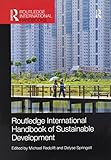(第1章)SDについてのポイント(院生を対象)
(追記, 20190702)"Sustainable Development Report 2019" が2019年6月に刊行されました。Sachs, J., Schmidt-Traub, G., Kroll, C., Lafortune, G., Fuller, G. (2019): Sustainable Development Report 2019. NY: Bertelsmann Stiftung and Sustainable Development Solutions Network (SDSN)。また追って内容を扱いますが、カントリーレポートでは、日本は162カ国中15位に位置づけられており、第4目標(教育)と第9目標(産業技術)では良い結果を示しています。しかし、第5(ジェンダー)、第12(生産消費)、第13(気候変動)、第17(連携)は赤信号です(pp.248-249)。
-----------------
これまでの開発議論とSDの違い:倫理的・政治的なSD議論には、
時間軸(遠い世代まで)、世代間と世代内の公平性、分野横断型にある。
- Brundtland 報告書のSD定義
development that meets the needs of the present without compromising the ability of future generations to meet their own needs (Brundtland Commission, 1987:41) (外務省(2015)の「持続可能な開発とは」では、"without compromising the ability of" が抜けており、使えない)
- Sachs (2015)による、SDGsの4つの目標とgovernanceを含む「SDコンパス(講義で扱う)」
...sustainable development recommends a holistic framework, in which society aims for economic, social, and environmental goals. Sometimes the following shorthand is used: SDGs call for socially inclusive and environmentally sustainable economic growth. To achieve the economic, social, and environmental objectives of the SDGs, a fourth objective must also be achieved: good governance...(p.2/3)
This definition has been brought into service int he absence of agreement about a process which almost everybody thinks is desirable. However, the simplicity of this approach is deceptive, and obscures underlying complexities and contradictions.
その上で、私たちの「social commitments」が重要だとする。
Developing countries have emulated Northern consumerist aspirations, with Southern elites enjoying new-found life-styles while basic levels of health, welfare and education for the majority fail to be attained (George 1976; 1988) (p.4)と指摘し、途上国とされる社会の中でも格差が存在することを指摘し、
さらに"The 'framing' of the concept of 'SD' reflected Northern constructions, and a particularly invasive form of Northern appropriation and domination that sometimes attempted to disguise the origins of the problematic while taking the higher moral ground."と欧米の経験と国際比較することの課題性を示す。
彼らは、SDとsustainabilityを厳密に区別したい人たちのために次のように記す:SD assumes that growth is possible and desirable. Both terms view the economy, the environment and society as inevitably bound up with each other, but sustainability does not assume that economic growth is essential, nor that economic growth will inevitably result in net environmental harm...However, like SD, sustainability has a 'complex conceptual structure (p.246)', (Paehlke, R. 1999 Towards defining, measuring and achieving sustainability. Sustainability and the Social Sciences, In E. Becker and T. Jahn eds. Sustainability and the Social Sciences. (pp.243–264). London: Zed Books. [This article reviews definitions of sustainability as well as a variety of sustainability measures and some of the policy tools necessary to achieving sustainability]) and is also deplored for its 'vague, ill-defined character' (Becker et al. 1999). It is also seen as introducing 'normative commitments to the development problematic', calling for justice for future generations and implying that the economic process should be 'subordinated to social and ecological constraints'...経済学による立場から捉え方が異なるものの結局は、"... this overall conception of 'the good life' is sometimes reffered to as 'sustainability', and sometimes as 'SD' (p.16)とする。
SDの分かりにくさについても、"...At the same time, the lack of specificity clouds its normative roles as a social goal which can only be achieved through examination of our own behaviour (Redclift 1996), not 'fixed' by management and technology (p.18)"と述べ、ブルントラント報告書の定義における「ニーズ」も曖昧であること、誰も答えを持っていないことを指摘し、またこうした定義の議論が私たちの行為に変化をもたらすべきプロジェクトなどの必要性を覆い隠してしまう危険性も示唆する。そのため、"...For social change to take place there needs to be, not a 'definition', but some consensus about the core meaning of the term and the moral imperative it offers for 'the good life'... Shifting from 'definition' to 'discourse' might elevate the power of SD as a 'site of political contest', the source of a new political world-view that contests that status quo (Jacobs 1999).と記す。

Routledge International Handbook of Sustainable Development (Routledge International Handbooks)
- 作者: Michael Redclift,Delyse Springett
- 出版社/メーカー: Routledge
- 発売日: 2017/05/03
- メディア: ペーパーバック
- この商品を含むブログを見る
- 同書は、SDを社会・環境・経済・組織という4つの観点すべてからアプローチすべきとしています。
- 教育については、Springett, D.が、ESD (Education for SD)を批判的教育学から紹介している。まず、環境教育(Lucas 1979にもとづき)を
- education in the environment (experiential education);
- education about the environment (providing information); and
- education for the environment (critical and political education examining the origins of the environmental problematic and preparing learners for an active role as agents of change).と紹介
その上で、The transformation of individual values and behaviour is emphasized rather than the ability of that individual to understand issues around power or to achieve the empowerment and progressive agency to confront these: to become a transformer. (p.106、下線・太字は丸山) ... the basic vision of the DESD reflected some of the principles that the Alternative Treaty (1992) had outlined. The goal was that education, in formal, non-formal and informal settings, should provide an effective vector to bring about the changes in values, attitudes and lifestyles to ensure a sustainable future and the evolution of just societies (p.108).と記す。ESDに必要な点は、社会・経済・自然の3つに加えて、4つ目に組織を挙げ、大学においても他分野との連携に課題が大きいことを述べる。大学でのESDは、UK Government (2010). Securing a Sustainable Future for Higher Education: An Independent Review of Higher Education Funding and Student Finance も参考。
- 同書では、Mahanti, A. & Manuel-Navarrete, D. も、"An important question associated with the emergence of 'sustainability', which could arguably be seen as an alternative to failed sustainable development global governance institutions, is to what extent non-governmental institutions will be interested, have the capacity, and might end up proving to be more effective in addressing equity, social justice, and human-environment relations (p.415). "とし、governanceの重要性を記す。